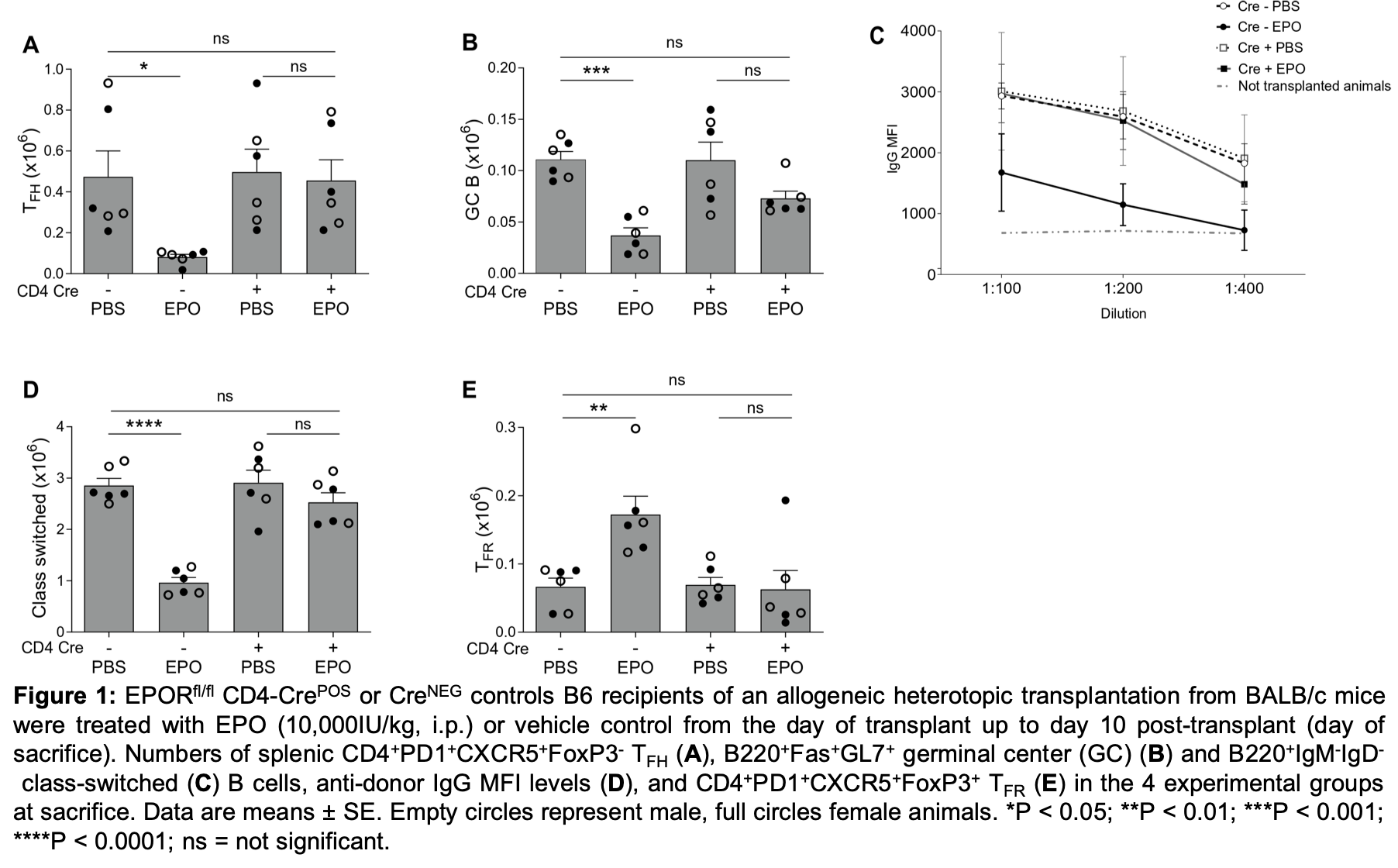Erythropoietin Reduces Alloantibody Formation by Inhibiting T Follicular Helper Cells
1Parma University, Parma, Italy, 2Icahn School of Medicine at Mount Sinai, New York, NY, 3St. Orsola Hospital University of Bologna, Bologna, Italy, 4Icahn School of Medicine, New York, NY
Meeting: 2020 American Transplant Congress
Abstract number: D-321
Keywords: Alloantibodies, B cells
Session Information
Session Name: Poster Session D: B-cell / Antibody /Autoimmunity
Session Type: Poster Session
Date: Saturday, May 30, 2020
Session Time: 3:15pm-4:00pm
 Presentation Time: 3:30pm-4:00pm
Presentation Time: 3:30pm-4:00pm
Location: Virtual
*Purpose: Donor-specific antibodies (DSA) develop in a significant minority of transplant recipients and are associated with increased morbidity and mortality, underscoring the need to identify approaches to prevent DSA formation. Building upon previous work showing that erythropoietin (EPO) directly inhibits effector T cells, we tested the hypothesis that EPO therapy limits DSA formation by directly inhibiting B cells and/or via inhibiting T follicular helper (TFH) cells required for class switch recombination and affinity maturation.
*Methods: We quantified DSA, splenic TFH, T follicular regulatory (TFR) cells, germinal center (GC) and class switched B cells in murine recipients of allogeneic heart transplants and in parent-to-F1 models of graft versus host disease (GVHD). We immunized C57BL/6J (B6) mice with sheep red blood cells (SRBC, T-cell-dependent) or with TNP-LPS (T-cell-independent), treated them with EPO or vehicle and quantified GC B cells, TFH, T follicular regulatory cells (TFR) and specific IgG antibodies. We used newly generated EPO receptor (EPOR)fl/fl CD4-CrePOS mice (lack EPOR on T cells) and CreNEG controls to test a direct effect of EPO on TFH and DSA in murine heart transplant recipients.
*Results: In heart transplant recipients, EPO reduced DSA, TFH, GC and class switched B cells, and increased TFR (Figure 1), effects not observed in mice lacking EPOR on T cells (Figure 1). EPO similarly reduced anti-SRBC IgG and GC B cells following SRBC immunization. In contrast, EPO had no effect in TNP-LPS immunized mice, together indicating EPO’s effect on preventing antibody formation is via targeting TFH rather than directly inhibiting B cells. In two parent to F1 models of GvHD, EPO reduced anti-dsDNA autoantibodies, TFH, GC B cells, and clinical expression of kidney disease, while in mice presensitized with BALB/c spleen cells, EPO limited post-transplant increases in DSA following a BALB/c heart transplant, together demonstrating clinical relevance.
*Conclusions: EPO inhibits T cell dependent IgG formation, including DSA by regulating T cell help to B cells. Our data provide support the need for studies testing the hypothesis that EPO treatment prevents DSA formation in human organ transplant recipients.
To cite this abstract in AMA style:
Cantarelli C, Guglielmo C, Bin S, Cumpelik A, Donadei C, Anderson L, Hartzell S, Budge K, Haverly M, Angeletti A, Manna GLa, Fiaccadori E, Maggiore U, Heeger P, Cravedi P. Erythropoietin Reduces Alloantibody Formation by Inhibiting T Follicular Helper Cells [abstract]. Am J Transplant. 2020; 20 (suppl 3). https://atcmeetingabstracts.com/abstract/erythropoietin-reduces-alloantibody-formation-by-inhibiting-t-follicular-helper-cells/. Accessed March 3, 2026.« Back to 2020 American Transplant Congress

